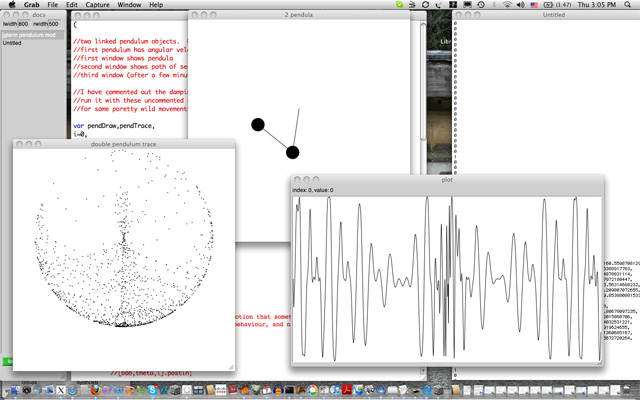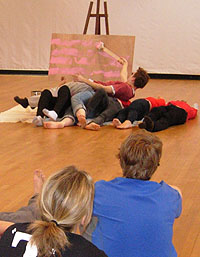Sciences Across the Curriculum Project Encourages Cross-Disciplinary Collaboration

Last fall, Stephen Devoto, associate professor of biology, associate professor of neuroscience and behavior, took on an unusual teaching engagement — to work with Peter Gottschalk, chair and professor of religion, in order to bring the science of evolution and animal development into Gottschalk’s course, “Religion, Science and Empire: Crucible of a Globalized World.”
“It was liberating to teach science in a different context than a typical science course with its attendant responsibility to cover a vast knowledge base, and to have students’ learning be driven by their interest in the intersection of science and religion,” Devoto says. “Students felt more comfortable learning about science in this type of environment.”
Religion, Science and Empire was one of four courses that received a 2009-10 Sciences Across the Curriculum (SaC) grant to support development of undergraduate courses that integrate Natural Sciences and Mathematics with Social Sciences, Arts and Humanities through cross-disciplinary collaboration between faculty. Initial funding for SaC was provided by the Mellon 23 Assembly, Howard Hughes Medical Institute, and Academic Affairs.
This year, SaC secured a grant from Wesleyan’s Fund for Innovation to support additional collaborative teaching experiments over the next few years, and faculty are invited to submit proposals for new courses or existing courses reconfigured to incorporate scientific content. The SaC committee includes Manju Hingorani, associate professor of molecular biology and biochemistry; Katja Kolcio, associate professor of dance; Christiaan Hogendorn, associate professor of economics; and Joe Bruno, professor of chemistry. The committee members welcome questions about the project and are available to consult with faculty on ideas and draft proposals, and to facilitate collaborations.
Guidelines for proposals and examples of course models and criteria for selection can be found here. The deadline is Dec. 1.
“The goal of Sciences Across the Curriculum is to develop more avenues through which students can engage with science in the context of their own academic interests, while learning the basic skills needed to appreciate science as a fundamental force that defines our society,” explains Hingorani. “Our hope is to enable more students who are not NSM majors to make personally meaningful and long-lasting connections with science.”
In Gottschalk’s class, students explore how the intersections of religion, science, and empire have enabled development of a globalized world from the age of Columbus through to the space race. During his visits to the class, Devoto led students through an exploration of human development from an evolutionary perspective, which included reading Your Inner Fish: A Journey into the 3.5-Billion-Year History of the Human Body, and a three-hour lab working hands-on with zebra fish and chicken embryos.
In Spring 2010, Liza McAlister, associate professor of religion, African American studies and American studies, and Erika Taylor, assistant professor of chemistry, assistant professor of environmental studies, developed a teaching module on climate change that was embedded in McAlister’s course, “The End of the World – End Times in American Religious Thought.” Brian Stewart, chair and associate professor of physics, associate professor of environmental studies, also participated in the course as a guest lecturer on the topic of global oil depletion.
McAlister’s course examines how some religious groups in the United States herald the hastening of the End Times, when a Messiah will appear to cleanse the earth of all unrighteousness. During the scientists’ visits, the class learned about oil reserve depletion, global climate change, and analyzed the 2006 documentary An Inconvenient Truth. They discussed how scientists evaluate data, how they present findings to the public, and how interpretations of scientific findings for popular audiences might engage with religious thought, myth-making narratives, or symbolic representations even as they may begin with secular assumptions.
“By the end, the students gained a literacy in reading scientific writings, and had a better understanding of how oil use and climate change will affect our future,” McAlister says. “Teaching the class with scientists was a wild ride and fun experiment.”
Ron Kuivila, director of the Electronic Music and Recording Studies, adjunct professor of music, and James Lipton, associate professor of computer science, also received a SaC grant for their linked Computer Science and Music courses on “Composing, Performing and Listening to Experimental Music.” The courses introduced students to an open-source computer music software that allowed them to produce and modify sound and create model graphics of sound and music.
Marty Gilmore, associate professor of earth and environmental sciences, and Jennifer Tucker, associate professor of history, associate professor of Science in Society and associate professor of FGSS, received the final SaC grant awarded in 2010. Their course, “Interpreting Life on Mars: Scientific Data and Popular Knowledge,” will be taught in Spring 2011. In this class, students will examine how data from Mars are interpreted and influenced by popular culture.

The SaC initiative grew in part based on Wesleyan’s Hughes Program in the Life Sciences experiences in collaborative teaching across disciplines — such as biology/philosophy-ethics and biology/computer science. Wesleyan has also hosted other cross-disciplinary courses in recent years that have the same broad goals as SaC, although they have been funded by other sources. These include “Science and Film: Defining Human Identity,” taught by Scott Higgins, associate professor of film studies and Robert Lane, associate professor of molecular biology and biochemistry; “Reproduction in the 21st Century,” taught by Laura Grabel, the Lauren B. Dachs Professor of Science and Society, professor and chair of biology, and Lori Gruen, chair and associate professor of philosophy, associate professor of environmental studies, associate professor of feminist, gender and sexuality studies; “Body Languages: Choreographing Biology,” taught by Hingorani and Kolcio; among others.
In Spring 2011, Jacob Bricca, adjunct assistant professor of film studies, and Suzanne O’Connell, associate professor of earth and environmental sciences, associate professor of environmental studies, will teach Making the Science Documentary (Bricca taught this class with Hingorani in 2007, 2009).
Because many interdisciplinary fields are new developments, individual faculty typically do not have in-depth training in them. Therefore, in order to introduce new fields into the curriculum, Wesleyan is helping faculty partner with each other and build bridges across disciplines — “which would be a less effective process if each faculty member undertook it alone,” explains Michael Weir, director of the Hughes Program, professor of biology.
“Building an interdisciplinary curriculum is much harder than building a standard curriculum, so programs like SaC provide honoraria to faculty for the extra time and effort put into developing new interdisciplinary modules and courses which can then evolve more easily in future years.”

